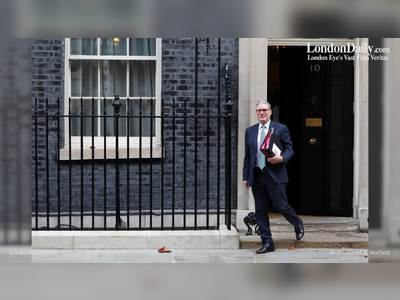UK Signals Intelligence Freeze Amid US Maritime Drug-Strike Campaign
Britain reportedly suspends sharing intelligence with Washington over the legality of US strikes on suspected drug vessels in the Caribbean
The United Kingdom has reportedly suspended at least part of its intelligence-sharing with the United States concerning suspected drug-trafficking vessels in the Caribbean, amid growing concern in London over the legality of American military strikes in the region.
The decision marks a rare rupture in the usually close intelligence relationship between the two allies.
The suspension reportedly stems from operations begun by the US in September 2025, in which the US military, under the administration of President Donald Trump, has carried out strikes on small vessels alleged to belong to “narco-terrorist” organisations.
At least seventy-six people are believed to have been killed in nineteen such attacks.
According to British sources, the UK fears that intelligence it supplies may be used to support operations that could amount to unlawful killings.
The UK, which retains oversight of several Caribbean territories and traditionally works closely with the US on maritime counter-narcotics and intelligence, is said to have halted sharing relevant tracking and surveillance data after internal legal reviews flagged that the US campaign may not meet international law standards.
The British government declined to publicly confirm the move, citing its longstanding policy of not commenting on intelligence matters.
In Washington, US Secretary of State Marco Rubio strongly denied the reports during a meeting of G7 foreign ministers, calling them a “false story” and reaffirming the strength of the US-UK cooperation.
He said that no change in the partnership had been discussed and that the US remains under threat from organised “narco-terrorists” in the hemisphere.
The rift comes at a time when the US is escalating its military presence in the region, including deploying the aircraft carrier USS Gerald R. Ford and its strike group as part of an expanded mission to detect and disrupt drug-trafficking routes.
The UK is now facing a delicate balancing act: maintaining its role as a key intelligence partner of the US while upholding its obligations under international law and preserving its own legal integrity.
Legal experts and former officials say the stakes are high.
If the UK were to provide intelligence that contributed to what it considers unlawful use of force, it could face political and legal repercussions, including potential complicity in extrajudicial killings.
Former UK Attorney-General Dominic Grieve said the reported British decision “may have been the only one consistent with our legal framework.”
For US allies and the broader “Five Eyes” intelligence community (comprising the UK, US, Australia, Canada and New Zealand), this episode raises broader questions about how intelligence cooperation is managed when policy diverges.
Some analysts believe the pause may prompt deeper legal scrutiny of the US campaign or push the UK to renegotiate the terms under which it provides maritime intelligence in the Caribbean.
At the same time, the Trump administration appears likely to continue its maritime campaign unabated.
As the trans-Atlantic intelligence partnership faces one of its most visible strains in decades, observers note that while London may have halted intelligence flows, the underlying security relationship remains intact — but now tempered by legal caution and diplomatic complexity.
The decision marks a rare rupture in the usually close intelligence relationship between the two allies.
The suspension reportedly stems from operations begun by the US in September 2025, in which the US military, under the administration of President Donald Trump, has carried out strikes on small vessels alleged to belong to “narco-terrorist” organisations.
At least seventy-six people are believed to have been killed in nineteen such attacks.
According to British sources, the UK fears that intelligence it supplies may be used to support operations that could amount to unlawful killings.
The UK, which retains oversight of several Caribbean territories and traditionally works closely with the US on maritime counter-narcotics and intelligence, is said to have halted sharing relevant tracking and surveillance data after internal legal reviews flagged that the US campaign may not meet international law standards.
The British government declined to publicly confirm the move, citing its longstanding policy of not commenting on intelligence matters.
In Washington, US Secretary of State Marco Rubio strongly denied the reports during a meeting of G7 foreign ministers, calling them a “false story” and reaffirming the strength of the US-UK cooperation.
He said that no change in the partnership had been discussed and that the US remains under threat from organised “narco-terrorists” in the hemisphere.
The rift comes at a time when the US is escalating its military presence in the region, including deploying the aircraft carrier USS Gerald R. Ford and its strike group as part of an expanded mission to detect and disrupt drug-trafficking routes.
The UK is now facing a delicate balancing act: maintaining its role as a key intelligence partner of the US while upholding its obligations under international law and preserving its own legal integrity.
Legal experts and former officials say the stakes are high.
If the UK were to provide intelligence that contributed to what it considers unlawful use of force, it could face political and legal repercussions, including potential complicity in extrajudicial killings.
Former UK Attorney-General Dominic Grieve said the reported British decision “may have been the only one consistent with our legal framework.”
For US allies and the broader “Five Eyes” intelligence community (comprising the UK, US, Australia, Canada and New Zealand), this episode raises broader questions about how intelligence cooperation is managed when policy diverges.
Some analysts believe the pause may prompt deeper legal scrutiny of the US campaign or push the UK to renegotiate the terms under which it provides maritime intelligence in the Caribbean.
At the same time, the Trump administration appears likely to continue its maritime campaign unabated.
As the trans-Atlantic intelligence partnership faces one of its most visible strains in decades, observers note that while London may have halted intelligence flows, the underlying security relationship remains intact — but now tempered by legal caution and diplomatic complexity.









